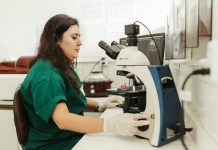
Researchers from Nagoya University Graduate School of Medicine have made a significant breakthrough that could lead to the early detection of gastric cancer through a simple blood test.
Gastrointestinal cancers, which include cancers of the esophagus, stomach, colon, liver, and pancreas, are often diagnosed at advanced stages when treatments are less effective.
Finding these cancers early can lead to better treatment outcomes and increase chances of survival.
The Discovery of SDF-4
The research team, led by Professor Yasuhiro Kodera, Dr. Mitsuro Kanda, and Dr. Takahiro Shinozuka, focused on finding a reliable biological marker that could signal the presence of cancer.
They found that a protein called stromal cell-derived factor 4 (SDF-4) is present in higher levels in the blood of cancer patients. This discovery was published in the journal Scientific Reports.
Advantages Over Current Tumor Markers
Traditional blood tests for cancer detection use markers like CEA and CA19-9, but these aren’t always accurate. SDF-4, on the other hand, showed high accuracy in identifying not just gastric cancer but several types including esophageal, colorectal, pancreatic, breast, and liver cancers.
Impressive Sensitivity and Specificity
The team’s research highlighted that SDF-4 has a 89% sensitivity rate, meaning it can correctly identify cancer in patients who have it, and a 99% specificity rate, meaning it can correctly identify patients who don’t have cancer.
These rates are significantly better than those of current tumor markers, particularly for early-stage gastric cancer, which often goes undetected until it’s more advanced.
Potential for Early Cancer Screening
Dr. Shinozuka highlighted the potential of SDF-4 as a diagnostic marker because it can detect early-stage cancer and is useful for various types of cancer.
The team is now collaborating with a company to develop devices that could use this marker for cancer screening. They hope that this will lead to its use in real-world cancer screenings, transforming how we detect and treat cancer in its early stages.
In conclusion, SDF-4 could be a game-changer in the fight against cancer, offering a new way to detect the disease earlier and more accurately.
With further development and success, this protein marker could soon be part of routine cancer screening, saving lives through early detection and treatment.
If you care about cancer risk, please read studies that exercise may stop cancer in its tracks, and vitamin D can cut cancer death risk.
For more information about cancer, please see recent studies that yogurt and high-fiber diet may cut lung cancer risk, and results showing that new cancer treatment may reawaken the immune system.
The research findings can be found in Scientific Reports.



